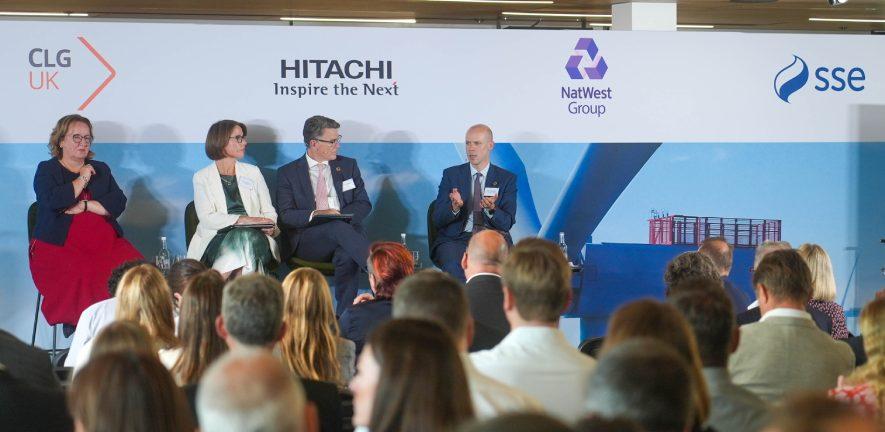
6 September 2024 - The Business of Leading the Energy Transition summit brought together industry leaders to hear from Head of Mission Control, Chris Stark, and Energy Minister, Michael Shanks MP, among others.
On 4 September, more than 100 energy professionals, thought leaders and members of parliament attended the Business of Leading the Energy Transition (BLET) summit in London, chaired by former BBC News anchor, Natasha Kaplinsky OBE. The summit was co-organised by the UK Corporate Leaders Group (CLG UK), SSE, Accenture, Hitachi, NatWest and Barclays.
The afternoon began with a keynote speech from Michael Shanks MP, Minister for Energy, Department for Energy Security and Net, who said that the new Labour government is determined to give clarity and confidence on where we’re heading and the speed of travel. He said: “We’re putting faith in the long-term strategy. 2030 is an incredibly ambitious goal, but that’s the point of being in government. We want to shape the future rather than blindly follow it.” As well as discussing the latest round of auctions that has granted projects to ensure enough renewable energy is captured to power 11 million UK homes, Shanks said: “This is the most decisive moment in the most decisive of decades – and I want everybody here to join us.”
The annual summit’s first panel – with Cathal Deasy, Global Co-Head of Investment Banking, Barclays; Alistair Phillips-Davies, Chief Executive, SSE; Professor Dame Julia King, Baroness Brown of Cambridge, Chair of the Carbon Trust & Chair, Adaptation Committee of the Climate Change Committee, and Kayte O'Neill, Chief Operating Officer, Electricity System Operator - looked at whether the UK is on course to deliver the 2030 net zero target.
Conversation ranged from the lack of necessary speed, with Phillips-Davies stating: “The key thing is to put pace into everything we’re doing,” to a lack of certainty causing nervousness in investing. O’Neill noted that: “While it’s a competitive space, the challenge is that investors are having to make choices on confidence and certainty. And if we can’t provide that we run the risk of that capital going elsewhere.”
Dame King also discussed the need to include civil society in the narrative, as consumers are the ones feeling the pinch and not understanding the lexicon used in the energy transition. “No one’s mentioned it, but we need to get the public on board. Industry and Government must work together for the public to be excited. We’ve got to get beyond, ‘no pylons in my back yard’.”
The second panel of the afternoon focused on how the UK can win the global green race and compete for capital, supply chain and skills, with Katie Murray, Group Chief Financial Officer, NatWest Group; Laura Fleming, Country Managing Director, UK & IE, Hitachi Energy; Toby Siddall, Sustainability Strategy Lead and UK & Ireland CSO, Accenture; and our very own Eliot Whittington, Chief Systems Change Officer from CISL. It looked at the policy barriers and argued for the planning system to be reformed. Whittington stated: “The biggest thing to be addressed here is leadership. Government has to show the leadership that’s needed and show us the direction of travel.” Fleming built on this, saying, “Planning, if done properly, is leadership. There’s an awful lot of strategising going on, but we need planning.”
The summit drew to a close with keynote speaker, Head of Mission Control for Clean Power 2030, Chris Stark, discussing his new role in his trademark honesty. As well as admitting he now gets sent merch, including a recent knitted doll of himself wearing a cape, he stated that his department will do in weeks what governments of old might have taken years to do.
“We have full backing of ministers right up to the Prime Minister... It’s a tremendously exciting role and we will create a plan that we have to deliver. It will be controversial. It will discuss the trade-offs, but I am hoping as a citizen of this country as much as Head of Mission Control that this is achievable.”




